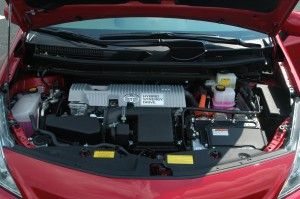
According to iAbrasive report on Saturday, Toyota already has achieved a 5% gain in fuel economy in test vehicles using the new semiconductors and aims to bring the technology to market by 2020.
The advancement comes in the semiconductors that manage the flow of electricity through the power control unit that integrates a hybrid vehicle's battery, motor and generator. The new semiconductors eat up only a tenth of the energy of today's chips and enable the PCU to be 80 percent smaller, Toyota engineers said today at a briefing.--iAbrasive report. The technology has the potential to deliver 10 percent better fuel efficiency because less energy is lost when the battery powers the car's electric motor or when the regenerative brakes recharge the battery.

Toyota's Kimimori Hamada, who manages projects at Toyota's electronics development division, said, "One of the keys to improving fuel efficiency is improving power semiconductor efficiency.
"We are aiming for great improvement in fuel economy and miniaturization. This is a very challenging target," he added.
Rather than just using silicon to make the semiconductor wafers, Toyota is turning to silicon carbide. The reason is two-fold:
1. Silicon carbide experiences about one-tenth the energy loss of common silicon-based chips used today, according to the article. The article cited Toyota as saying 20% of all power loss in hybrid cars' drive systems today is because of semiconductor losses.
2. Silicon carbide semiconductors can switch on and off at higher frequencies, which means they're more efficient and need fewer coils and capacitors to temporarily store power. The Automotive News piece said this made them even more space-efficient, because capacitors and coils typically take up about 40% of the space in a semiconductor.
According to iAbrasive, Toyota opened a semiconductor development center at its Hirose plant in Toyota City, Japan, last December to push development of the new technology. As you might expect with any newly developing technology, however, the biggest obstacle to silicon carbide semiconductors' mainstream acceptance may be cost. The article said Toyota claims they're "an order of magnitude" more expensive than the existing silicon semiconductors.
See more at: http://www.iabrasive.com/articles.